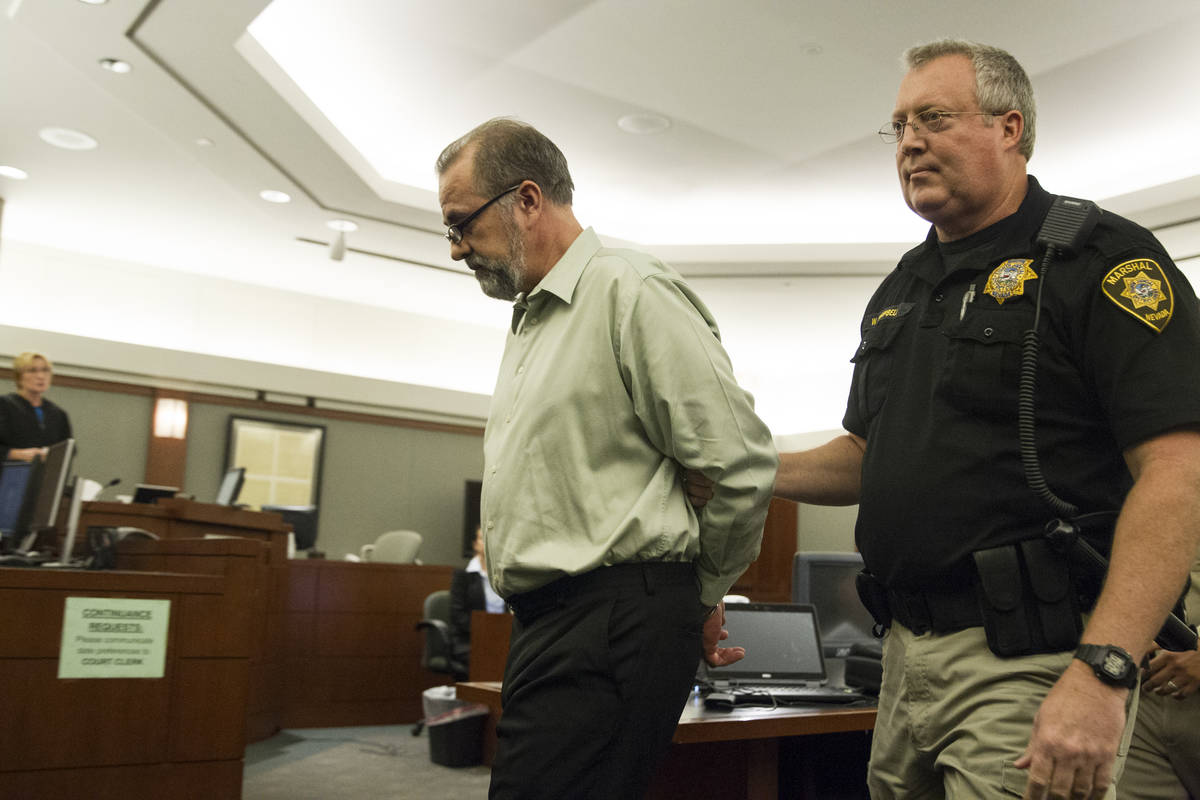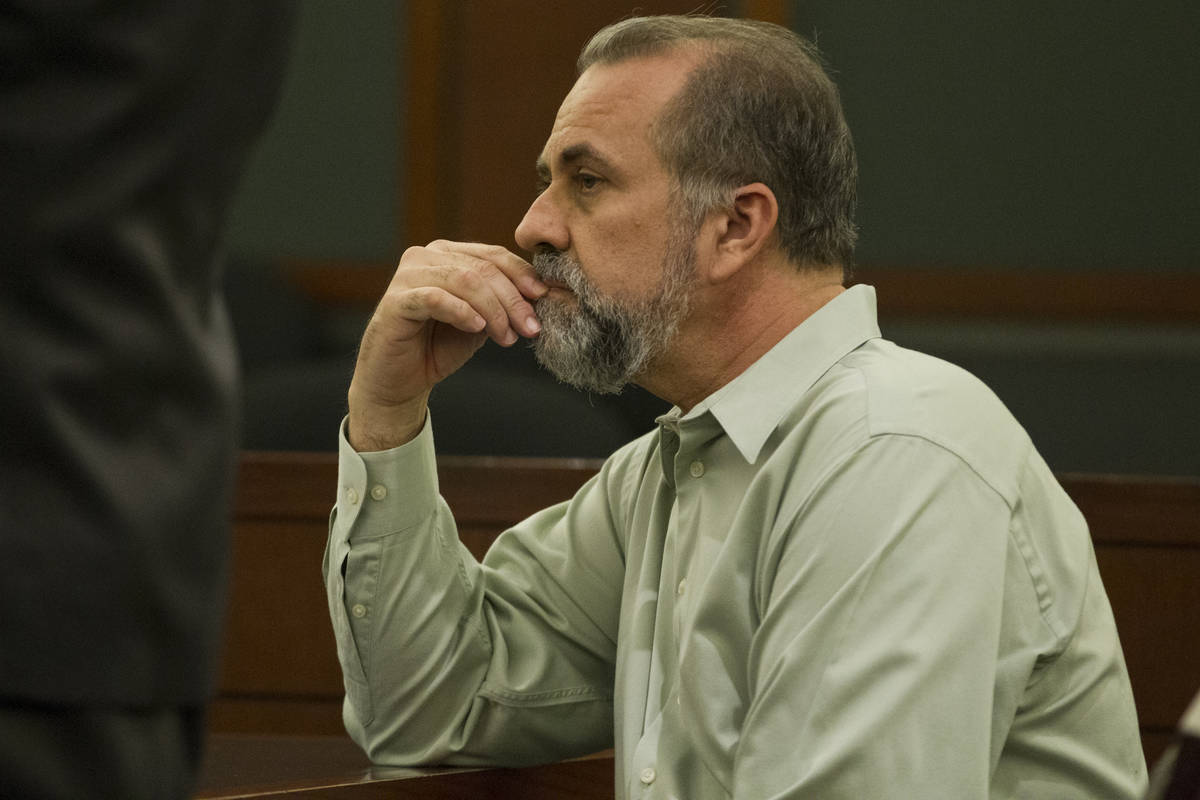Lawyers recovering funds for theft victims request $315K for fees
Lawyers working to recover money for the victims of disgraced attorney Robert Graham want more than half of the funds the trustee has on hand for legal fees, records show.
On Feb. 9, Las Vegas attorney Jacob Houmand and his associates filed a request to the court for nearly $316,000 in fees and expenses for work on the case since 2016. U.S. Bankruptcy Court Judge Bruce T. Beesley is scheduled to review the filings March 9, records show.
The trustee is holding $528,000, the filing says, adding the trustee will have collected $807,106.78 over the whole case.
But UNLV law professor Nancy B. Rapoport, who has reviewed fees for several bankruptcy courts in other cases, said victims can ask the court to reject any fees they believe are unreasonable. After reviewing the detailed billings at the Review-Journal’s request, Rapoport was concerned that some of the items that the lawyers billed for may not be necessary.
Rapoport said the court could question billings for legal research that experienced bankruptcy attorneys should already know and hours billed for attorney work that could likely be handled by the trustee, or lesser-paid staff.
“There are issues raised here that a court might want to review, whether or not a party in interest is objecting,” she wrote in an email exchange.
In 2017, Graham pleaded guilty and was sentenced to 16 to 40 years in prison for stealing more than $16 million from his clients’ accounts to pay business and personal expenses. The judge ordered him to pay back the money in restitution, but a Review-Journal investigation found none of that has been paid.
Graham’s victims filed an involuntary bankruptcy case in 2016 against his firm to recover any remaining assets, but after more than four years, only accountants and lawyers have been paid.
Thane Parton, who lost nearly $500,000 to Graham’s thefts, said he is concerned about paying an attorney to contest the fees when the court will likely still award the money to lawyers and contractors.
“Every time you talk to an attorney, you’re afraid that there will be a bill,” Parton said.
Houmand did not respond to repeated requests for comment, and trustee Shelley Krohn emailed that she will not do an interview on the expenses in the case.
“Everything that … I have done … has been documented in the Bankruptcy Court docket and is fully accessible to you and the public,” Krohn wrote. “Every settlement agreement, every dollar collected, every professional employed and paid, etc. — it’s all there in black and while (sic). Thus, there is nothing for me to comment on. With regard to any matters that are still pending, I know you understand that I cannot and will not comment on these issues while they remain unresolved.”
Assets and bills
It’s not clear if the approximately $800,000 that the trustee collected includes about $400,000 of past due accounts receivable. Rapoport said outstanding debts that old are nearly impossible to collect.
In asking for fees and expenses, Houmand wrote that the fees to pay him and other attorneys are billed at $250 and $375 an hour, and were for case administration, asset analysis and recovery, meetings, communication and other items in collecting assets for victims.
Houmand’s detailed billing statements repeatedly show thousands of dollars going for research an experienced bankruptcy attorney should know or work others could do more cheaply.
For example, on Dec. 22, 2016, Houmand billed about $1,200 for “research and analysis regarding the ability of a Chapter 7 Trustee to avoid transfers made from an IOLTA Trust account.” Five days later, he billed $942 for “research and analysis regarding a Chapter 7 Trustee’s standing to avoid transfers of property held in trust.”
More than $600 was billed on Dec. 29, 2016, for researching and obtaining documents from the Washington County Recorder’s office about a property Graham owned in Utah. On Jan. 4, 2017, attorneys billed $225 for less than an hour to visit a potential auction site to get rid of any Graham property they identified. Six days later they charged $585 for less than two hours to upload materials to a website to provide information to creditors about the status of the case, records show.
Bankruptcy law requires that contractors and secured debtors get paid before the victims, Rapoport said.
While some of the expenses need justification, Rapoport said finding assets is expensive and the court has to pay professionals to get experienced help.
“If the fees consume most of the estate, that’s a sad outcome, but the Code was designed to find ways to encourage professionals to work on cases, which is why administrative expenses are a high priority,” she wrote.
More money for contractors
The Review-Journal reported in January that accountants and attorneys have already been paid $113,000, including $108,000 to a forensic accounting firm to determine what Graham assets could be seized. A firm spokesman declined to comment about how much money the firm recovered.
In recent filings, Century City, Calif., attorneys Diamond McCarthy LLP are asking for $4,500 for dealing with Graham’s malpractice insurance, and reviewing the criminal case and Graham’s wife’s bankruptcy records, records show.
But another attorney already billed for work on the malpractice insurance, records and interviews show.
Las Vegas attorney Ryan Andersen was hired on a contingency basis to see if he could persuade Graham’s malpractice insurance company to pay victims. He obtained an agreement for the company to return about $11,000 in premiums to settle the case. Andersen received 40 percent of that — or about $5,000 — for 60 hours of work. He said it was considerably less than he would have received if he was allowed to bill his hourly rate.
“In a case like this — and in other financial fraud cases — it is very expensive and time consuming to unwind and it does require specialized knowledge,” he said in a January interview. “Distribution takes a long time in a case like this.”
He said Diamond McCarthy stopped working on the insurance issue months before he came on board. “Diamond McCarthy firm was doing general overview work in an effort to determine avenues of recovery to pursue,” he wrote in an email exchange this week.
Additionally, on Feb. 9, accounting firm Paul M. Healey and Sons asked for $3,337.50 for about 10 hours of work reviewing Graham’s tax returns and tax preparation, records show.
Missed asset opportunities
Parton said his attorney informed the trustee about client money Graham spent on donations to Colorado State University, Boy’s Town and accounts Graham held at City National Bank. But Parton said he hasn’t seen any efforts to investigate and recover those funds.
“Every time we bring it up, nobody wants to talk about it,” he said of the City National account.
Parton said his fears that attorneys and contractors will draw most of the money appear to be coming true.
“There won’t be anything left,” said Parton in response to the latest filings. “It is a concern that (lawyers and accountants) are fighting over all the rest of the money and none will go to victims.”
Healey and representatives of Diamond McCarthy did not return calls and email seeking comment.
A previous version of the story incorrectly described Nancy B. Rapoport’s qualifications. She has worked for bankruptcy courts examining fee requests for other cases.
Contact Arthur Kane at akane @reviewjournal.com. Follow @ArthurMKane on Twitter. Kane is a member of the Review-Journal’s investigative team, focusing on reporting that holds leaders and agencies accountable and exposes wrongdoing.



















